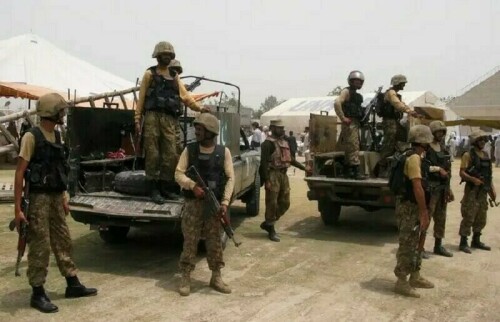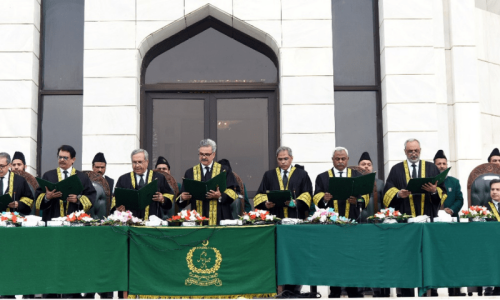ISTANBUL, Dec 5: Pakistan is awaiting “concrete proof” on suspicions that a Pakistan-based militant group was behind last week’s deadly attacks in Mumbai, President Asif Ali Zardari said on Friday.
“Pakistan is currently doing its own internal investigation and is waiting for concrete proof to be handed over to us,” Mr Zardari told reporters here after a trilateral meeting with the leaders of Turkey and Afghanistan.
“Our position is that we have always been and still are the victims of terrorism,” he said.
Mr Zardari was responding to a question on suspicions that the 10 militants behind the Mumbai attacks belonged to the Lashkar-i-Taiba based in Pakistan.
He denied that the attacks would in any way affect Pakistan’s efforts to combat extremist elements on its own soil. “The focus of the government of Pakistan has been anti-terror....We will continue with our fight against the perpetrators and stateless actors of terrorism,” he said.
Trilateral talks
Earlier, the presidents of Afghanistan and Pakistan discussed fresh measures to curb militants in Turkish-sponsored talks, pledging stronger cooperation against terrorism.
Afghan President Hamid Karzai said ties with Pakistan had improved “extremely well” since the election of his counterpart Asif Ali Zardari in September, pointing to a recent decision by the two countries’ foreign ministers to outline a joint strategy to fight militant groups.
“We discussed the need for institutional arrangements between the two governments to work out plans... that will take us to a more detailed, more cooperative struggle against terrorism in the region,” Mr Karzai told a joint press conference.
The two presidents and their Turkish counterpart Abdullah Gul issued a joint statement after the meeting, stressing “their determination to strengthen trilateral cooperation to confront the scourge of terrorism in all its forms.”
They also approved plans for trilateral cooperation between their militaries and intelligence agencies on counter-terrorism, the establishment of a joint mechanism against drug smuggling and possible joint military and police training courses.
The statement reaffirmed the need to “respect and preserve the unity and territorial integrity of all regional countries” and to uphold the “principles of non-intervention” in internal affairs.
Mr Gul said the three leaders also discussed the tensions between Islamabad and New Delhi after last week’s attacks in Mumbai. “We jointly condemn the Mumbai attacks,” he said.
The trilateral meeting was the second of its kind after an initial summit in Ankara on April 30 last year, in which Mr Karzai and then Pakistani president Pervez Musharraf pledged to step up joint efforts against militants and take measures to boost mutual confidence.—AFP













































